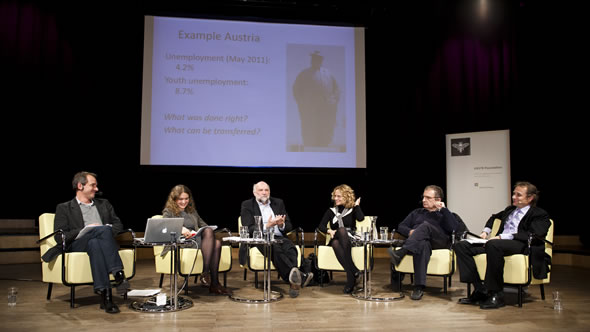Vienna – Public ESI event at RadioKulturhaus: Has transition failed in the Balkans?

27 October 2011, 19:00
RadioKulturhaus
Argentinierstraße 30a, 1040 Vienna
Has transition failed in the Balkans?
Social crisis, record unemployment, youth without hope.
What can be done?
While many European economies are today struggling in the face of a deep economic and fiscal crisis, the Western Balkans has been struggling with economic crisis for more than three decades. In the recent downturn an already bad situation with some of the highest unemployment rates in Europe – in most countries above 20 percent – is only getting worse.
Throughout the region post-communist deindustrialization has not been reversed. Productivity is low, while the fiscal burden of social spending (on pensions, on veterans benefits) remains very high. The average citizen of Serbia is still poorer today than in 1990. Youth unemployment in Serbia is close to 50 percent. In Macedonia it is higher still. Croatia, having just concluded its EU accession negotiations, has youth unemployment rates approaching 40 percent, the level of Greece. In Kosovo, the poorest and most isolated part of the region, more than 35,000 young people join the labour market every year, but there is no job growth.
This is not only a social and economic crisis: it is also an intellectual and political one. The growth model of the past decade – hoping for foreign direct investment, growth driven by consumer credits – has been shaken. In the case of Croatia, even a successful process of EU accession has not brought much needed job creation. Where are the new policy prescriptions, and where is new energy to carry out serious changes going to come from? Are exhausted populations and citizens, already deeply cynical about their leaders and vague promises of the gains of "transition" and "reform", ready to embrace change? And if so … is it clear, to leaders and to opinion makers in these countries, what is to be done?
Introduction, panel discussion, and questions from the audience
You need to upgrade your Flash Player to version 9 or higher in order to listen to this file properly. Please download it here.
Please also insure that JavaScript is enabled in your browser settings.
Audio: ERSTE Stiftung. All rights reserved.



Sekerinska Bogosavljevic Shahini
Join ESI and ERSTE Foundation for a panel discussion on these issues with:
- Radmila Sekerinska, Chair of National European Integration Council and former Deputy Prime Minister of the Republic of Macedonia, Skopje
- Srdjan Bogosavljevic, Managing Director, Ipsos Strategic Marketing, Belgrade
- Besa Shahini, Senior Analyst, European Stability Initiative (ESI), Pristina
- Vladimir Gligorov, Senior Economist, Vienna Institute for International Economic Studies (WIIW), Vienna
- Ulrich Schuh, Head of Economics and Finance Department, Institut für Höhere Studien (IHS), Vienna
Moderated by: Kristof Bender, Deputy Chairman, European Stability Initiative (ESI)



Gligorov Bender Schuh
The event will take place in English. ERSTE Foundation is delighted to invite you for a glass of wine afterwards.
Entrance is free, but please register at +43(0)1 501 70-337 radiokulturhaus@orf.at.
This event is jointly organized by ERSTE Stiftung and the European Stability Initiative (ESI) as part of a series of presentations on FRESH THINKING FOR EUROPE.
Previous events can be listened to here:
- Freedom of movement in Europe – dream or nightmare in a populist age?
- European Islam and Muslim neighbours – Fears and Opportunities


If you are interested on some background reading on "Has transition failed in the Balkans?", have a look at ESI's case studies on challenges of transition, carried out in past years as part of its new economic geography of the Balkans project supported by ERSTE Stiftung:
